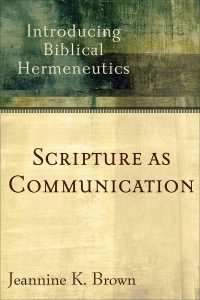My reading this week made a connection between the method of interpretation and the authority of Scripture. The reason why some choose “reader response” as a hermeneutical method of scripture rather than “authorial intent” is because they do not want the authority of God’s Word on its divinely inspired terms. They want the meaning of scripture in human terms to suit personal interests.
Two Methods of Interpretation:
1. Reader Response (wrong & dangerous)
2. Authorial Intent (right & productive)
Reader response is reading the Bible to suit what you want it to say and mean. Authorial intent rests upon what the Biblical authors intended by the Spirit in terms of meaning and principles (patriarchs, kings, sages, prophets, apostles, etc.). The tension is reminiscent of making something “in your own image” vs. accepting scripture as God’s revealed and authoritative word. Even further, the Bible is authoritative only to the extent people agree with it (i.e., it is not authoritative to those engaged in Reader Response).
Key gems in our reading distill these assembled facts: Those who refuse to acknowledge the Bible’s authority will not experience spiritual transformation by the Spirit and the Word. The Bible inherently possesses authority regardless of whether or not the church or individual recognizes it. The ontological ground of the text’s authority is not the same as the epistemic acceptance of the text’s authority. God’s act of inspiration grounds the Bible’s status as God’s revelation. God speaks through the Word whether people recognize or accept its authority or not and it is for this reason that contemporary agendas will never gain control over theology.
The weight of authority comes from a source of authority by revelation as God’s self-witness (e.g., fulfillment of prophecy, miracles, promises, judgments, etc.). This stands as warranted belief in the face of a multitude of defeater claims.
There is a difference between “what it meant” and “what it means.” “What it meant” leads to “what it means” as a matter of coherent principle where implications follow the intent and not what a reader surmises. Especially to form preferred outcomes according to biases stemming from cultural contexts. Moreover, it is possible to treasure biblical principles more than the Bible itself.













